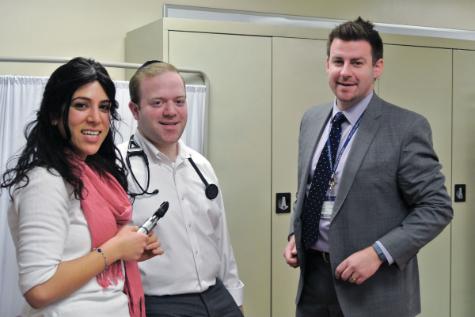Caring Through Communication
Meeting the Challenges of Today’s Healthcare Workplace with Interprofessional Training

"Early on in my career as a physician assistant, I looked after patients with multiple chronic conditions and illnesses that needed several specialists involved in their cases. Communication was critical,” recalls Nathan Boucher, director of graduate education Physician Assistant Program at Touro’s School of Health Sciences. “With transitions between workers taking place every eight, 12 and 24 hours, there were a lot of chances to drop the ball.”
The increasing complexity of today’s healthcare environment as well as the demands placed on our current system from millions of the newly insured under the Affordable Care Act (ACA), are challenging traditional methods of healthcare delivery and training. At the School of Health Sciences, the teaching of new, more collaborative approaches to patient care are meeting these challenges and transforming how students are trained.
“A patient’s well-being hinges on how well a healthcare team communicates and shares information and ideas,” explains Professor Boucher. At Touro, collaboration is demonstrated in both classwork and hands-on training. “Our students hear from practicing professionals who present case studies. A portion of each session focuses on how collaboration has or hasn’t been applied, and how this impacted patient care.”
During clinical rotations, Touro students bring their training to the workplace. In settings where interprofessional teamwork is not yet a key part of care, Touro students’ collaborative skills can make a difference.
This focus on interprofessional training began several years ago when Dean Louis H. Primavera, Ph.D., began laying the groundwork to prepare students for this new workplace. In 2013, he formed the Interprofessional Education Committee within the School of Health Sciences and tapped Mr. Boucher as its chair. “Communication and collaboration is an important part of PA training,” explains Mr. Boucher. “So naturally, I was eager to become involved.”
Today, the results of this shift in focus can be seen throughout the School’s academic and clinical coursework, especially during a student’s senior year, at the School’s annual Interprofessional Education (IPE) Symposium. This important day-long event, which grew out of the Committee’s work, brings together seniors from all the health sciences degree programs, including occupational therapy and occupational therapy assistant, physician assistant, physical therapy, nursing, speech and language pathology, as well as faculty and facilitators. The day of presentations, discussions and breakout sessions includes panelists from areas outside the School’s disciplines who address healthcare challenges in their patient populations and how IPE is helping to solve these issues. Hearing from experts in social work, community pharmacy, physical medicine and rehabilitation, aging services, nutrition and hospital administration helps expand students’ understanding of the totality of patient care.
In preparation, each degree program utilizes, as part of their curriculum, the same case study in its section on safe discharge planning. On Symposium Day, students break into small groups comprised of a mix of disciplines, where each member describes how they evaluate cases to determine a patient’s readiness for discharge.
“Students see how much more comprehensive a patient’s plan becomes with input from other disciplines,” explains Jill Horbacewicz PT Ph.D. Chair/Director of the Physical Therapy Department and who has had a key role in the planning and implementation of the Symposium.
“Students finish the day feeling they’ve learned how collaboration can impact patient care,” explains Professor Boucher. “As a result, they feel better prepared to enter the workforce and to practice team-based care.”
A special thank you
These Touro Interprofessional Education Committee members planned the event and worked hard to make the day happen.
Nathan Boucher (PA)
Jill Horbacewicz (PT)
Suzanne White (Nursing)
Steven Blaustein (SLP)
Andrew Siegal (Assistant Dean SHS)
Rivka Molinsky (OTA)
Alexander Lopez (OT)
This article appeared in the Spring 2015 edition of Touro Links

